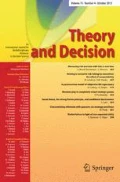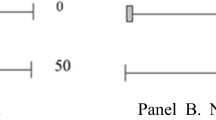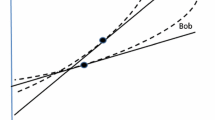Abstract
Rawls' Difference Principle asserts that a basic economic structure is just if it makes the worst off people as well off as is feasible. How well off someone is is to be measured by an ‘index’ of ‘primary social goods’. It is this index that gives content to the principle, and Rawls gives no adequate directions for constructing it. In this essay a version of the difference principle is proposed that fits much of what Rawls says, but that makes use of no index. Instead of invoking an index of primary social goods, the principle formulated here invokes a partial ordering of prospects for opportunities.
Similar content being viewed by others
Bibliography
Plott, Charles R.: 1978, ‘Rawls' theory of justice: An impossibility result’, in Hans W. Gottinger and Werner Leinfellner (eds.), Decision Theory and Social Ethics: Issues in Social Choice (D. Reidel, Dordrecht, Holland).
Rawls, John: 1971, A Theory of Justice (Harvard University Press, Cambridge, Mass.).
Rawls, John: 1974, ‘Reply to Alexander and Musgrave’, Quarterly Journal of Economics 88, pp. 633–55.
Rawls, John: 1975, ‘A Kantian conception of equality’, Cambridge Review, pp. 94–99.
Rawls, John: 1977, ‘The basic structure as subject’, American Philosophical Quarterly 14, pp. 159–65.
Author information
Authors and Affiliations
Rights and permissions
About this article
Cite this article
Gibbard, A. Disparate goods and Rawls' difference principle: A social choice theoretic treatment. Theor Decis 11, 267–288 (1979). https://doi.org/10.1007/BF00126381
Issue Date:
DOI: https://doi.org/10.1007/BF00126381




